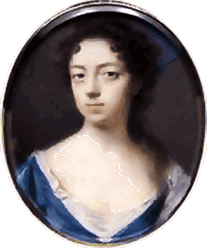

ANNE FINCH, COUNTESS OF WINCHILSEA, English author, daughter of Sir William Kingsmill of Sidmonton, near Southampton, was born in April 1661. Five months later her father died, and her mother married in 1662 Sir Thomas Ogle. Lady Ogle died in 1664, and nothing is heard of her daughter Anne until 1683, when she is mentioned as one of the maids of honour of Mary of Modena, duchess of York.
She married in May 1684 Colonel Heneage Finch, who was attached to the duke of York's household. To him she addressed poems and versified epistles, in which he figures as Daphnis and she as Ardelia. At the Revolution Heneage Finch refused the oath of allegiance to William and Mary, and he and his wife had no fixed home until they were invited in 1690 to Eastwell Park, Kent, by Finch's nephew Charles, 4th earl of Winchelsea, on whose death in 1712 Heneage Finch succeeded to the earldom. The countess of Winchelsea died in London on the 5th of August 1720, leaving no issue, her husband surviving until 1726.
Lady Winchelsea's poems contain many copies of verse addressed to her friends and contemporaries. She was to some extent a follower of the "matchless Orinda" in the fervour of her friendships. During her lifetime she published her poem "The Spleen" in Gildon's Miscellany (1701) and a volume of Poems in 1713 which included a tragedy called Aristomenes.
With Alexander Pope she was on friendly terms, and one of the seven commendatory poems printed with the 1717 edition of his works was by her. But in the farce Three Hours after Marriage (1717) attributed to Gay, but really the work of Pope, Arbuthnot and Gay, she is ridiculed as the learned lady, Phoebe Clinket, a character assigned to Pope's hand.
Lady Winchelsea's poems were almost forgotten when Wordsworth in the "Essay, supplementary to the Preface" of his Poems (1815), drew attention to her nature-poetry, asserting that with the exception of Pope's "Windsor Forest" and her "Nocturnal Reverie," English poetry between Paradise Lost and Thomson's Seasons did not present "a single new image of external nature." Wordsworth sent at Christmas 1819 a MS. of extracts from Lady Winchelsea and other writers to Lady Mary Lowther, and his correspondence with Alexander Dyce contains some minute criticism and appreciation of her poetry.
Mr Edmund Gosse wrote a notice of her poems for T. H. Ward's English Poets (1880), and in 1884 came into possession of a MS. volume of her poems. A complete edition of her verse, The Poems of Anne, Countess of Winchilsea, was edited by Myra Reynolds (Chicago, 1903) with an exhaustive essay. See also E. Gosse, Gossip in a Library (1891).
Excerpted from:
Encyclopedia Britannica, 11th Ed., Vol. XXVIII.
Cambridge: Cambridge University Press, 1910. 702.

Anne Finch | Biography | Works | Resources | Essays | Books | 18th C. Lit

|
to Anne Finch, Countess Of Winchilsea |

|
to Restoration and 18th-C. Literature |

|
to Luminarium |
Portrait Anne Finch, Countess Of Winchilsea by by Peter Cross c.1690.
© National Portrait Gallery, London. With their generous permission.
Site copyright ©1996-2006 Anniina Jokinen. All Rights Reserved.
Created by Anniina Jokinen on November 24, 2006.
Anne Finch, also known as Anne Kingsmill and Anne Kingsmill Finch was Countess of Winchilsea, also known as Winchelsea in England. She was an English Poet of the Restoration and 18th century and her poems are considered to be some of the few great poems on nature between Milton's Paradise Lost and Thomson's Seasons. Her poetry is part of the canon of english literature and she is one of the few female (feminine, woman, women, poetess) writers. A lady poet, she is part of the Early Modern women writers, and . Her part in history was not appreciated until first Wordsworth, and then Edmund Gosse, noted her in his criticism. She can be considered part of the canon of early modern women writers during the renaissance and renaissance women writers.
Anne Finch, also known as Anne Kingsmill and Anne Kingsmill Finch was Countess of Winchilsea, also known as Winchelsea in England. She was an English Poet of the Restoration and 18th century and her poems are considered to be some of the few great poems on nature between Milton's Paradise Lost and Thomson's Seasons. Her poetry is part of the canon of english literature and she is one of the few female (feminine, woman, women, poetess) writers. A lady poet, she is part of the Early Modern women writers, and . Her part in history was not appreciated until first Wordsworth, and then Edmund Gosse, noted her in his criticism. She can be considered part of the canon of early modern women writers during the renaissance and renaissance women writers.